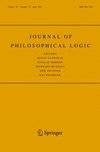Common Ground in Non-face-to-face Communication: In Sensu Diviso or In Sensu Composito
IF 0.7
1区 哲学
0 PHILOSOPHY
引用次数: 0
Abstract
Traditional definitions of common ground in terms of iterative de re attitudes do not apply to conversations where at least one conversational participant is not acquainted with the other(s). I propose and compare two potential refinements of traditional definitions based on Abelard’s distinction between generality in sensu composito and in sensu diviso.
非面对面交流中的共同点:In Sensu Diviso 或 In Sensu Composito
以迭代的 "重新"(de re)态度来定义共同点的传统定义并不适用于至少有一位对话参与者与另一位(或多位)对话者并不熟悉的情况。我根据阿伯拉尔(Abelard)对 "感性构成"(sensu composito)和 "感性分割"(sensu diviso)的一般性的区分,提出并比较了对传统定义的两种潜在改进。
本文章由计算机程序翻译,如有差异,请以英文原文为准。
求助全文
约1分钟内获得全文
求助全文
来源期刊

JOURNAL OF PHILOSOPHICAL LOGIC
PHILOSOPHY-
CiteScore
2.50
自引率
20.00%
发文量
43
期刊介绍:
The Journal of Philosophical Logic aims to provide a forum for work at the crossroads of philosophy and logic, old and new, with contributions ranging from conceptual to technical. Accordingly, the Journal invites papers in all of the traditional areas of philosophical logic, including but not limited to: various versions of modal, temporal, epistemic, and deontic logic; constructive logics; relevance and other sub-classical logics; many-valued logics; logics of conditionals; quantum logic; decision theory, inductive logic, logics of belief change, and formal epistemology; defeasible and nonmonotonic logics; formal philosophy of language; vagueness; and theories of truth and validity. In addition to publishing papers on philosophical logic in this familiar sense of the term, the Journal also invites papers on extensions of logic to new areas of application, and on the philosophical issues to which these give rise. The Journal places a special emphasis on the applications of philosophical logic in other disciplines, not only in mathematics and the natural sciences but also, for example, in computer science, artificial intelligence, cognitive science, linguistics, jurisprudence, and the social sciences, such as economics, sociology, and political science.
 求助内容:
求助内容: 应助结果提醒方式:
应助结果提醒方式:


